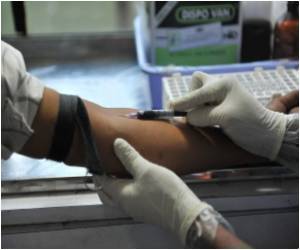Scientists have suggested that a highly sensitive blood test could help identify heart attacks in thousands of patients who would otherwise have gone undiagnosed.

The University of Edinburgh study found that after this test was introduced into clinical practice the risk of being readmitted to hospital with - or dying from - another heart attack within the following year was halved.
Patients were more likely to see a specialist and to receive better treatment following the introduction of the more sensitive test.
When patients are admitted to hospital with chest pain, a blood test is taken that measures a protein - troponin - that is released when heart cells are damaged during a heart attack.
Researchers evaluating the more-sensitive test detected troponin at levels four-times lower than the previous standard test, thereby identifying patients with smaller amounts of heart damage.
The study analysed data from more than 2,000 patients who had been admitted to the Royal Infirmary of Edinburgh with chest pain and suspected heart attack.
Source-ANI
 MEDINDIA
MEDINDIA



 Email
Email










